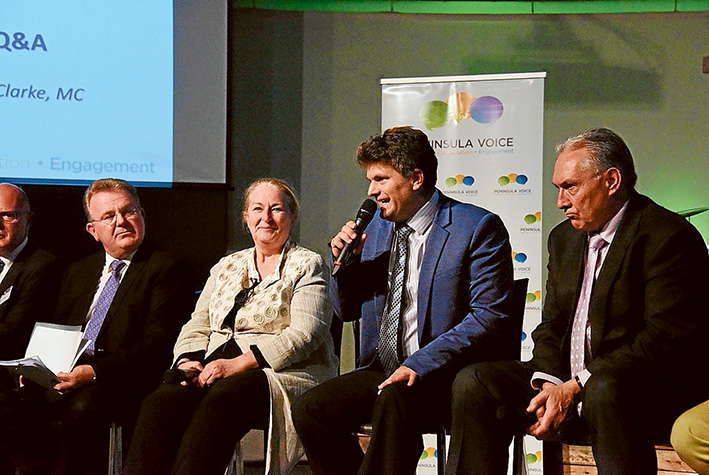
THE ‘What’s the Real Story with Ice’ forum presented by Peninsula Voice attracted 330 people to the Peninsula City Church in Frankston on Wednesday 27 April.
Local churches, Frankston Council, health professionals, civic leaders, police, community support groups, Rotary and members of the community displayed solidarity to show how the Frankston community can work together to reduce the harmful effects of this new drug on our streets.
Unflattering statistics provided by Victoria Police Crime Command Inspector Rod Wilson listed Frankston among the worst substance abuse and crime areas in Australia. They showed a direct correlation between the rise in substance abuse and the rise in petty crime, suggesting crime is increasing to feed the substance abuse addiction.
The expert panel made it clear that while ice is a new drug, substance abuse is an old problem. “The mood of the meeting was that this whole-of-community problem requires a whole-of-community response to move the continuum in the right direction away from harm,” Peninsula Voice chairperson Peter Orton said.
“If we didn’t act on the root causes of substance abuse, then growth in both substance abuse and crime would continue to rise. Support services and the police are finding it difficult to deal with this demand on services and current efforts are akin to sticking a band-aid on a gaping wound.”
A passionate Dunkley MP Bruce Billson spoke of the findings of the National Ice Taskforce report by former Chief Commissioner Ken Lay, while Curtin University professor Stephen Bright spoke of building a better Rat Park.
Rat Park was ground breaking research into drug addiction in the 1970s by Canadian psychologist Bruce Alexander. He found that, through building stronger relationships and more engaged communities, there will be less self-medication through miss-use of alcohol, as well as legal and illegal substances.
Australian Drug Foundation head Julie Rae spoke about the River. This is a metaphor of the stream of people who fall into substance abuse and are unable to get out. The story is predicated on looking upstream at why some people succumb to substance abuse, while others do not.
Family Drug Support manager Michael Miller detailed how family support was the most effective mechanism for helping a substance abuse victim. He outlined targeted drug education sessions beginning today (Monday) 9 May in Frankston.
Local mother Kerrie Knight gave a sobering account of her daughter, India’s, five-year struggle with an ice addiction. Having overdosed five times, her personal story was a powerful message that substance abuse does not discriminate, nor is it based on education, socio economic position or status.
The account reverberated around the room: if it can happen to me it can happen to you.
Ms Knight and another mother from an ice-affected family were interviewed at the forum by the ABC’s flagship current affairs program, AM. The story aired the next morning on the ABC’s National program.
“The overwhelming message was that substance abuse is a community health issue and requires a whole-of-community response and that harm minimisation for the victim and family was paramount for recovery,” Mr Orton said.
During the question-and-answer segment there was common support for the direction Portugal had taken to reduce personal substance use by decriminalising it.
Money saved through this approach has been funnelled into a state of the art health service and treatment for users, and has also allowed police to focus on fighting organised crime and drug cartels, which target victims of substance abuse.
“Kerrie and India’s story is very powerful but, unfortunately, not unique,” Mr Orton said.
“Kerrie didn’t choose to have an ice-addicted daughter. She has endured a tough challenge and, as a parent myself, I can’t image how difficult the past five years has been for her and her family.
“What is particularly inspiring, though, is how Kerrie has responded. She has decided to do something about this. It is not dissimilar to the story of Rosie Batty taking up the fight for change on family violence.
“Substance abuse and addiction is an illness that requires long-term treatment for people to recover – it is not a moral failing.
“Simply advising young people not to take drugs is not the answer. Community is the key element to help deliver education and early intervention and harm minimisation.”
Other points raised were:
- We have a huge gap in the community for a local family support network.
- The trauma of drug addiction has a ripple effect on to family members, which impact family members’ mental health.
- Because of the stigma attached to addiction, we don’t feel comfortable talking about it.
- Ice-affected families fear judgment, which limits opportunities for open conversation.
- We need more open conversation, not less.

1 Comment
We have just started a group called ICE FIGHT MURWILLUMBAH
To help the family’s of users of ICE!
Any information or advice or maybe even help from doctors,, physicist’s etc!
All would be greatly appreciated!
Kindest regards Libby! 🙂